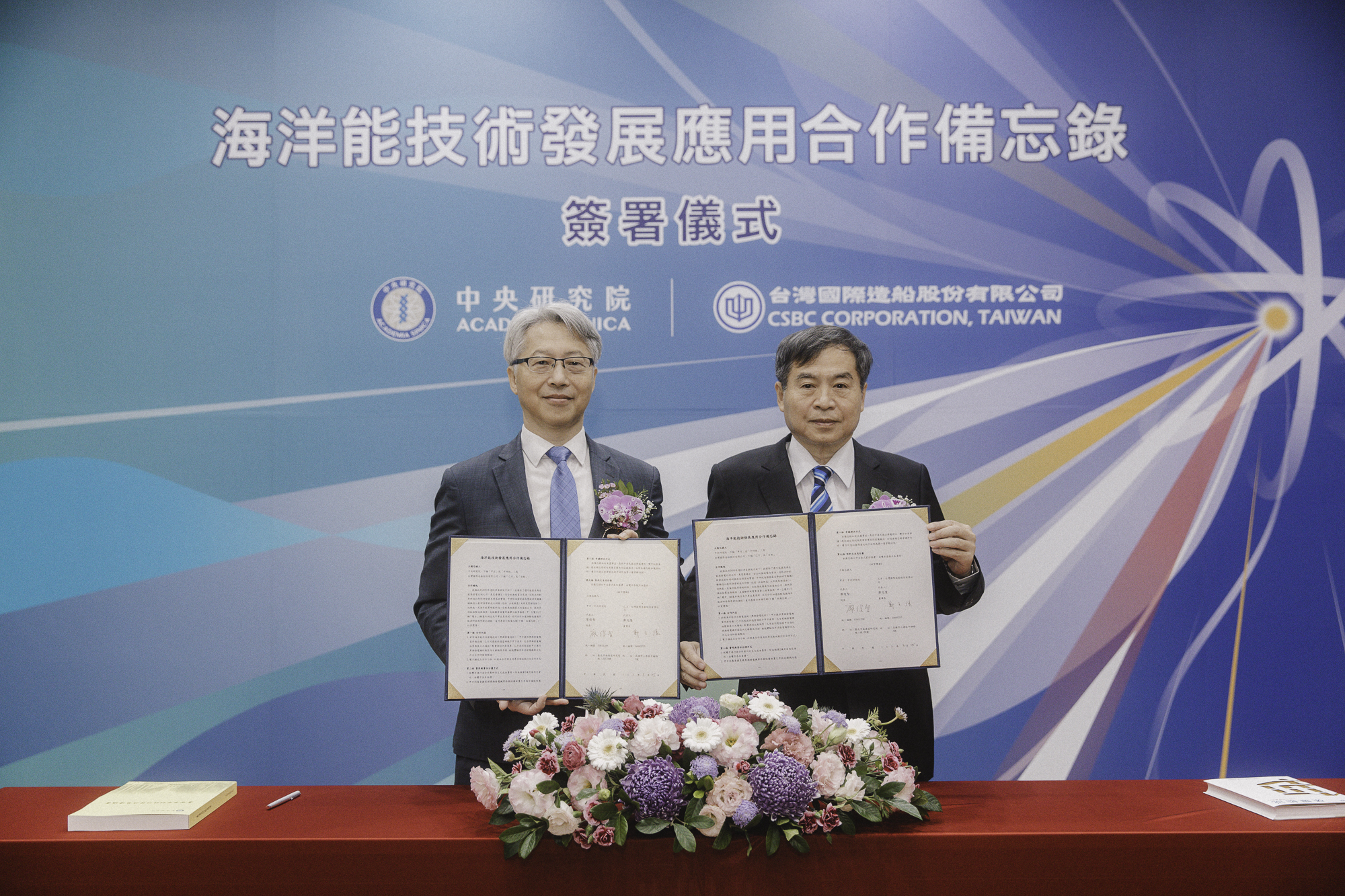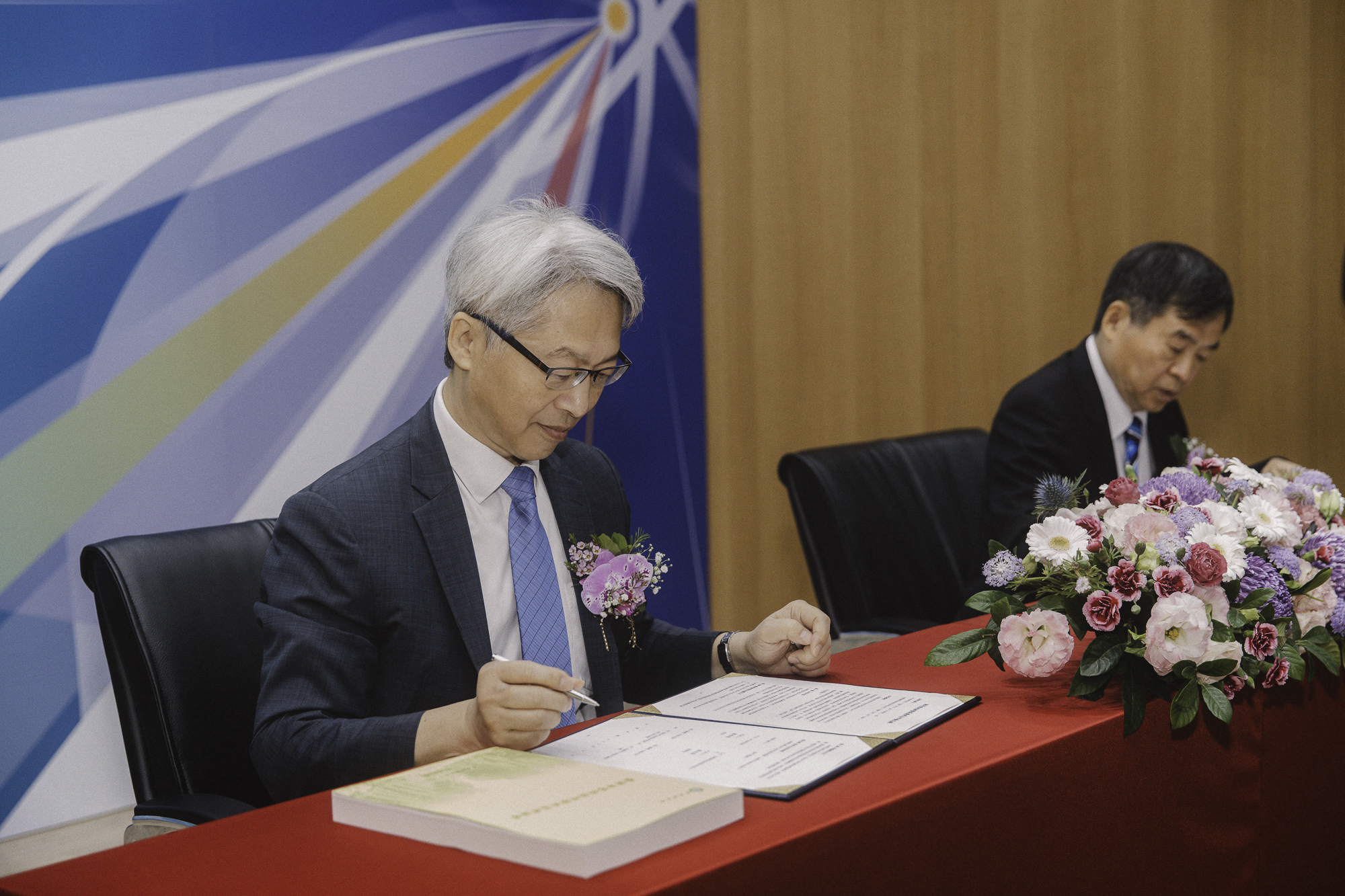Date: 2024-03-25
Academia Sinica signed a Memorandum of Understanding on Cooperation in Marine Energy Technology Development and Application with CSBC today (March 25th). Academia Sinica President James C. Liao announced that the institute is developing and manufacturing a 100 kW ocean current turbine generator, with plans to test it offshore near Taitung in southern Taiwan this year. The collaboration will combine the marine energy research capabilities of Academia Sinica with the maritime engineering strengths of CSBC, speeding up the offshore testing and deployment of Kuroshio Power Generation Technology.
Academia Sinica: Ocean Current Turbine Generator to Be Tested Offshore This Year, Aiming to Boost Taiwan's Zero-Carbon Electricity
President James C. Liao pointed out that the key to the global net-zero transition lies in the immediate research and development and implementation of innovative technologies. The Kuroshio Current off the east coast of Taiwan is the world's second-largest ocean current, with a strong, stable flow near the coast, offering considerable potential for marine current energy development. Ocean currents can generate electricity year-round, and the generation process does not require fuel, nor does it emit greenhouse gases or pollutants, thus offering potential to serve as a base-load power. Taiwan has invested in research and development of marine energy generation technology over the past decade but has faced challenges in site selection, maritime engineering, turbine generator installation, and cable transmission technologies.
In 2022, Academia Sinica released its "Taiwan Net-Zero Technology R&D Policy Recommendations" white paper, recommending the government expedite the development of marine energy as part of a "Five Net-Zero Arrows" strategy. At present, a Thematic Center for Marine Energy is established within Academia Sinica’s Research Center for Critical Issues to engage in research and development. Progress has been made in marine current detection, ocean current turbine generator manufacturing, and anchoring methods. After conducting vessel surveys in the eastern maritime areas, a site off the coast of Chenggong in Taitung County, with stable currents and favorable seabed geological conditions, has been selected for the possible deployment of Kuroshio power generation.
Meanwhile, Academia Sinica is developing and manufacturing a 100 kW ocean current turbine generator with corrosion and pressure resistance akin to a submarine, and plans to commence onsite testing this year. President Liao said that as the largest shipbuilding company in the country, CSBC can help turn research into reality through its shipbuilding and maintenance skills, and support for offshore wind power and other maritime engineering technologies, accelerating the practical implementation of technology and helping Taiwan swiftly increase the proportion of zero-carbon electricity.
CSBC: Rich Experience in Maritime Engineering to Support Development of Marine Energy in Taiwan
CSBC Corporation Taiwan Chairman Cheng Wenlong stated that, in response to international environmental regulations and the shipping industry's demand for carbon reduction, CSBC is engaging in green energy research and development. This includes the design of oceanographic research vessels, environmentally friendly ships, smart energy and carbon reduction technologies, and energy storage systems. He emphasized that the preliminary progress of Academia Sinica's Kuroshio Power Generation Technology, combined with CSBC's extensive experience in shipbuilding and maritime engineering, provides a solid foundation for developing green marine energy technology.
As the global climate change crisis accelerates, marine energy is considered a key option for zero-carbon energy. The cooperation between Academia Sinica and CSBC will integrate scientific research with industrial practice, jointly promoting the development and application of marine energy technology and contributing to the green transformation of Taiwan and the world, and working together towards the goal of net-zero emissions by 2050.
Academia Sinica's "Strategic Recommendations for Science and Technology Actions towards Net Zero Emission in Taiwan" is available online at https://sec.sinica.edu.tw/archives/e4240dc6ac12d3d4
-
Dr. Yue-Gau Chen, Center for Sustainability Science, Academia Sinica
(02) 2787-5800,ygchen@gate.sinica.edu.tw
-
Ms. Steffi Tung Lin, Media & Public Affairs, Secretariat, Academia Sinica
(02) 2789-8820,tunglin@as.edu.tw
-
Ms. Tsuey-Yin Piong, Media & Public Affairs, Secretariat, Academia Sinica
(02) 2789-8821,fangzi@as.edu.tw
-
 (From left to right) James C. Liao, President of Academia Sinica; Wen-Long Cheng, Chairman of CSBC Corporation Taiwan. Photo credit: Academia Sinica.
(From left to right) James C. Liao, President of Academia Sinica; Wen-Long Cheng, Chairman of CSBC Corporation Taiwan. Photo credit: Academia Sinica.
-
 Net Zero Carbon Emissions by 2050 Academia Sinica and CSBC Corporation Taiwan Sign MOU on Marine Energy Technology and Deployment of Kuroshio Power Generation. Photo credit: Academia Sinica.
Net Zero Carbon Emissions by 2050 Academia Sinica and CSBC Corporation Taiwan Sign MOU on Marine Energy Technology and Deployment of Kuroshio Power Generation. Photo credit: Academia Sinica.
-
 Academia Sinica signed a Memorandum of Understanding on Cooperation in Marine Energy Technology Development and Application with CSBC. Photo credit: Academia Sinica.
Academia Sinica signed a Memorandum of Understanding on Cooperation in Marine Energy Technology Development and Application with CSBC. Photo credit: Academia Sinica.
-
 Chau-Hwang Lee, Acting Director of the Research Center for Critical Issues of Academia Sinica (right), shows the ocean current turbine generator model to Wen-Long Cheng. Photo credit: Academia Sinica.
Chau-Hwang Lee, Acting Director of the Research Center for Critical Issues of Academia Sinica (right), shows the ocean current turbine generator model to Wen-Long Cheng. Photo credit: Academia Sinica.









 Home
Home
